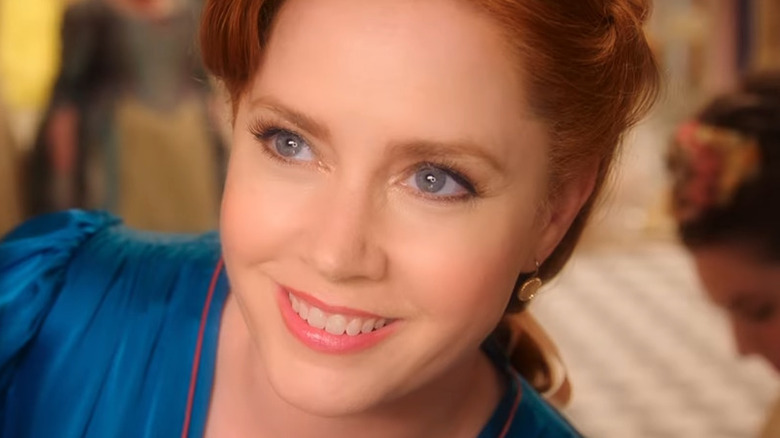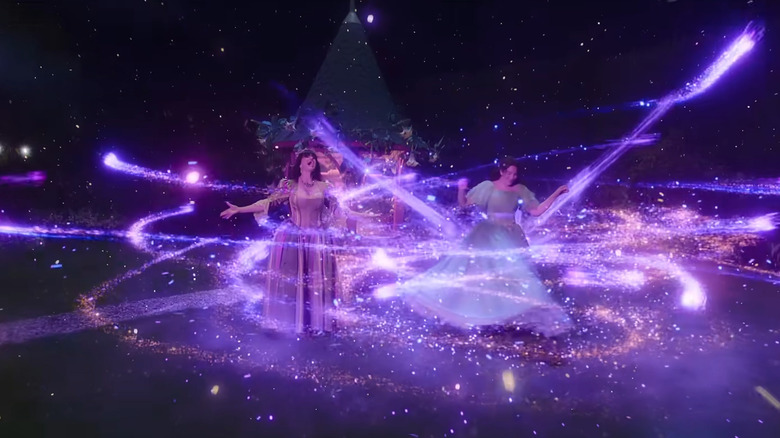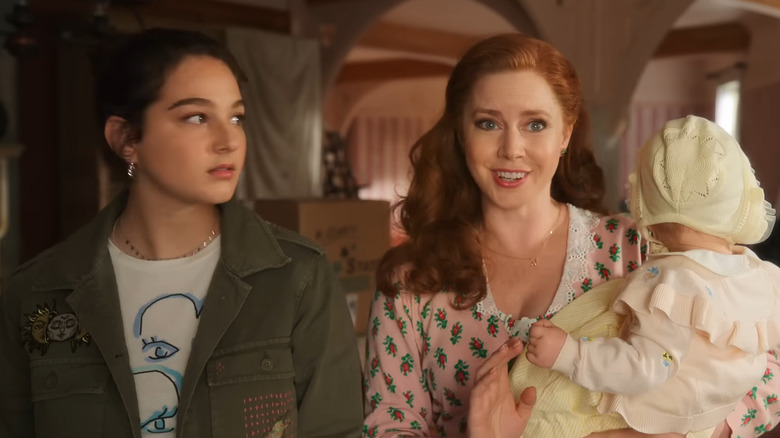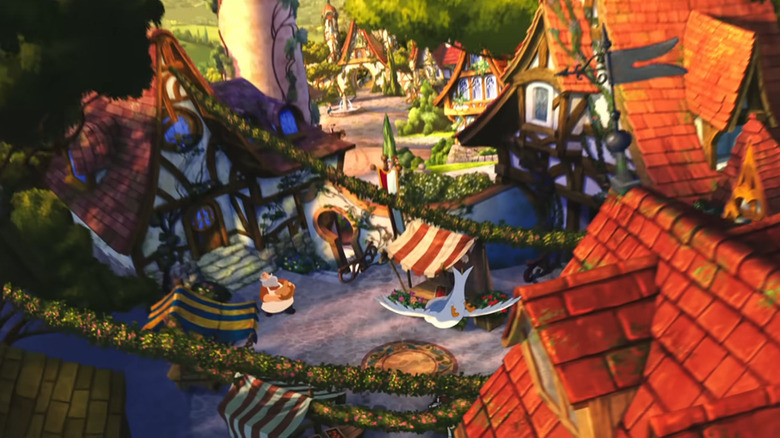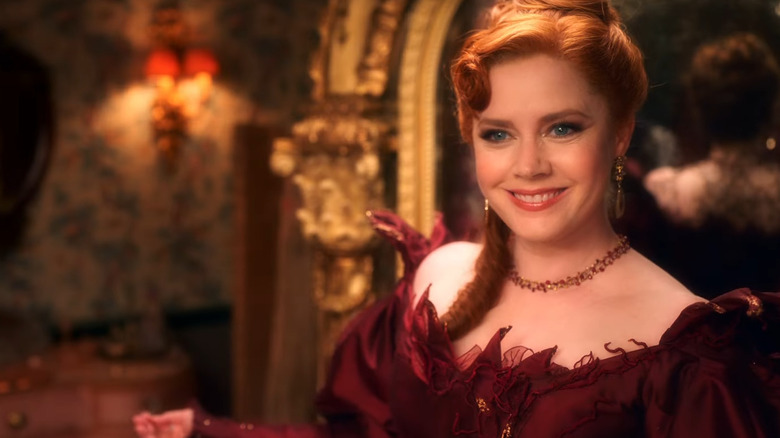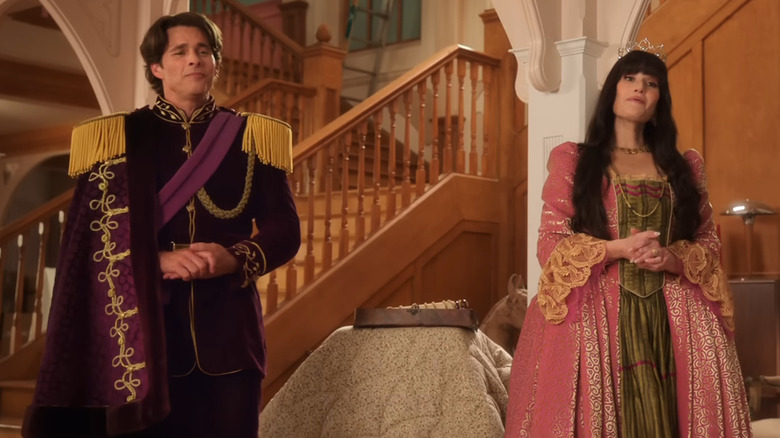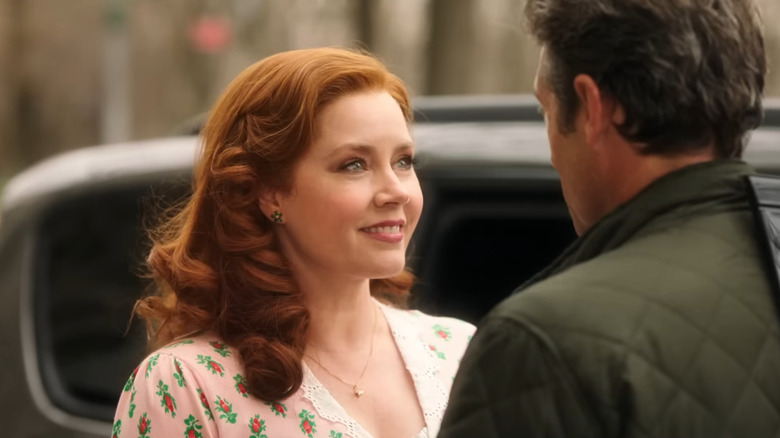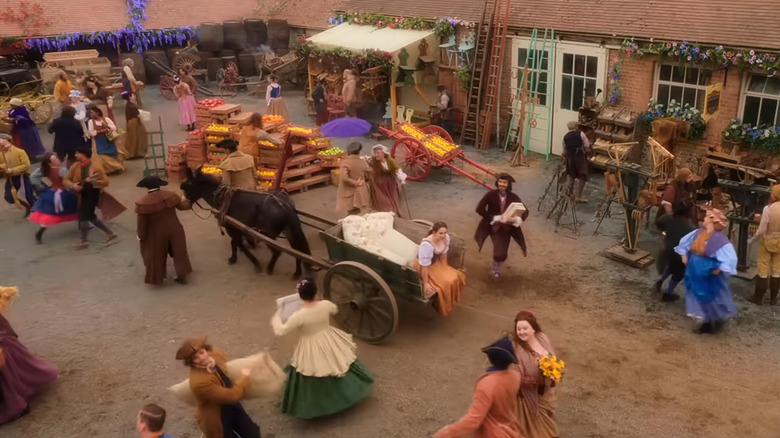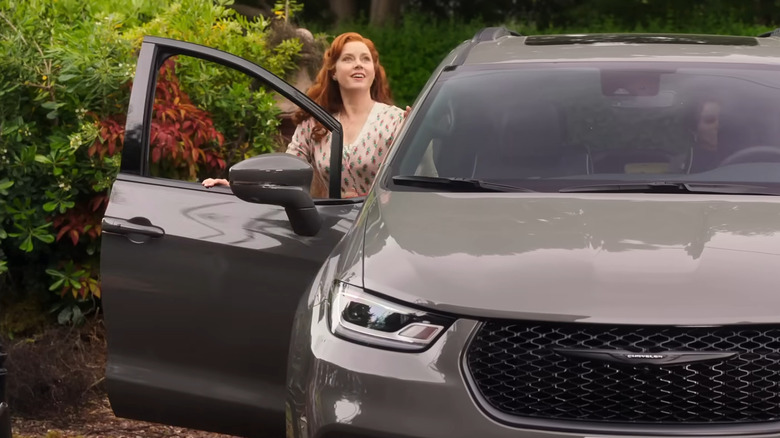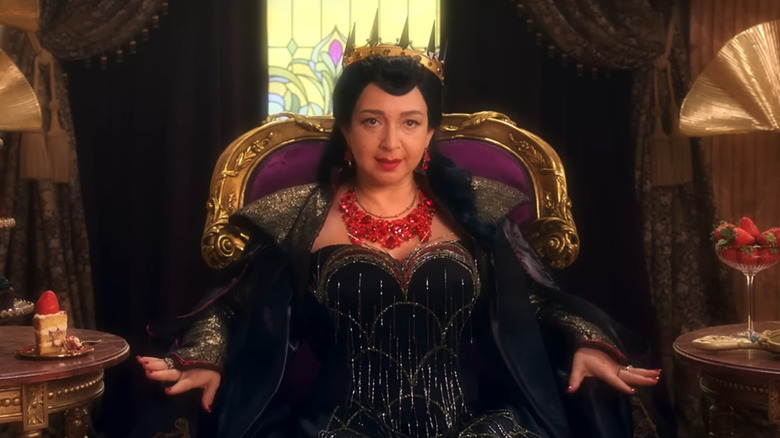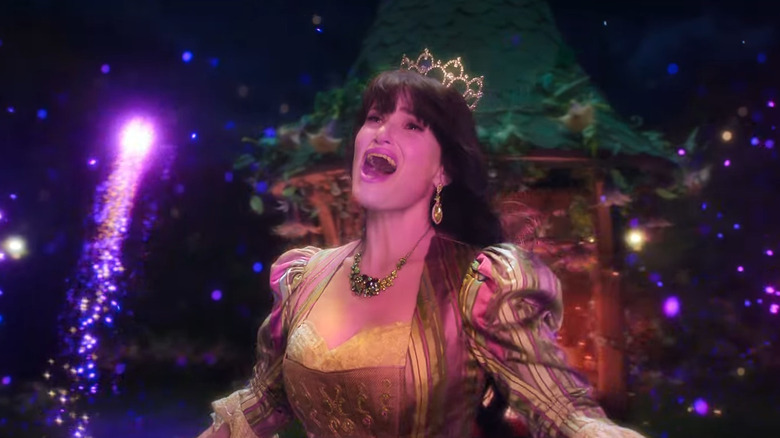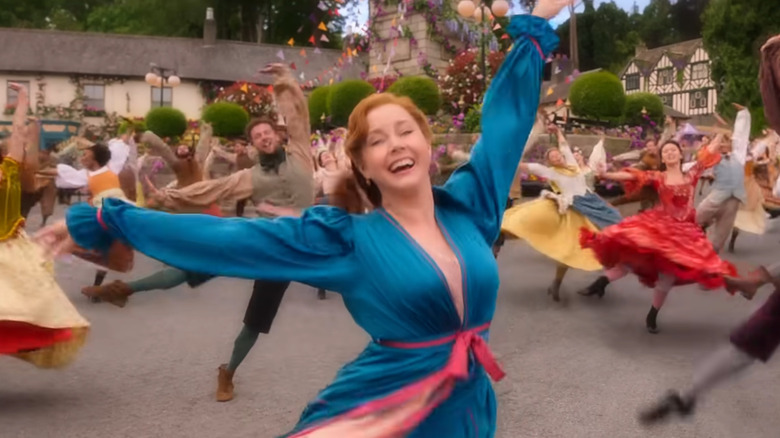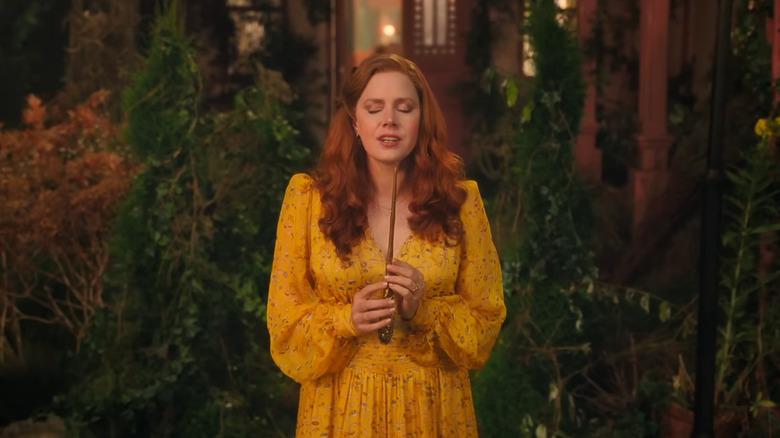Disenchanted's Best Musical Moments Ranked
"Oh, this is, like... a full musical." The realization of this fact as one indulges upon "Disenchanted," the 2022 sequel to Disney's 2007 fairytale parody hit "Enchanted," is either delightful or bemoaning, depending on the viewer's preferences. It's likely a safe bet, though, that if you're back for seconds — especially 15 years later — the news comes as a pleasant surprise.
"Enchanted" only had five songs, gradually performing a metamorphosis of musical style as the film progressed. It began with an unapologetic orchestral tune and ended with a contemporary song, its moments in between bridging the gap and paralleling Giselle's journey. "Disenchanted" dismisses this playbook, but it has good reason to do so. As Giselle (Amy Adams, who also produces the sequel) makes a wish for reality to become like a fairytale, the movie leans into the genre for the majority of its soundtrack.
This choice affords "Disenchanted" space to follow, more or less, the traditional framework of a musical — much different than a movie that happens to have a few songs in it. This means there are a lot more songs, several of them performed multiple times in a variety of arrangements. Oscar winners Alan Menken and Stephen Schwartz wrote all of the songs in "Disenchanted," just as they did for the original. At the heart of these new compositions, the audience finds memorable new anthems worthy of the Disney legacy. Below, a (spoiler-heavy) ranking of the songs from the sequel.
12. Love Power (End Credits)
As the credits roll on "Disenchanted," the audience hears a pop version of "Love Power," a song performed by Idina Menzel as Nancy earlier in the movie. Menzel is quite the impressive performer, with her final note in this song nearly guaranteed to be the longest you'll hear in any tune this year. While the song itself is great, its radio edit doesn't elevate it to new heights.
A pop version played in the credits of a song from the movie is a Disney tradition going back decades. Celine Dion and Peabo Bryson sang a contemporary version of their film's title track during the end credits of 1991's "Beauty and the Beast," while Michael Bolton belted out his take on "Go the Distance" at the conclusion of 1997's "Hercules." Curiously, "Disenchanted" chooses to have its credits song's original performer sing the song again for the pop version. Even in "Frozen" and "Frozen 2," Menzel's own "Let It Go" and "Into the Unknown" were covered by Demi Lovato and Panic! At the Disco, respectively.
Once "Love Power (End Credits)" is complete, the remainder of the credits replays two of the movie's other songs, unchanged from their original form. In contrast, 2007's "Enchanted" concluded with a wondrous, instrumental suite of its five songs. Passing up the chance to create the sequel's equivalent feels like a missed opportunity.
11. Song fake-out
The ending of the original "Enchanted" seemed to indicate that Giselle had fully adapted to reality, saying goodbye once and for all to her days of bursting out in song. The beginning of "Disenchanted" shows that's not entirely the case. While Giselle has been away from her fairytale home for a number of years when the audience catches up with her in the new film, she still retains some of her default tendencies from Andalasia — though, other people often encourage Giselle to repress these habits.
Seeking a change of pace, Giselle and her family — husband Robert (Patrick Dempsey), stepdaughter Morgan (Gabriella Baldacchino), and baby Sofia — move from New York City to the suburbs of Monroeville. On the first night in their new home, a small fire breaks out in Morgan's bedroom and she has to sleep on the floor of her parents' room while the smoke clears. As Giselle lies down to sleep, reflecting on the big day they all just had, she softly begins to sing a reprise of an earlier tune. "Here we are, a family starting over..." she starts, before Morgan shoots a condescending "Mom!" and causes Giselle to stop.
It's a funny gag in the moment, but taking a step back, it speaks to a bigger theme of Giselle finding it difficult to fully be herself while also fully adapting to the world around her, specifically when it comes to connecting with Morgan. That would've been a lovely nighttime ditty that you missed out on, Morgan.
10. Andalasia
A sweeping, triumphant, symphonic swell of music — even more so than the usual amount — accompanies the Disney logo at the very beginning of "Disenchanted," clueing the audience in that they're in for a particularly magical two hours. While the sequel doesn't start with a full 10 minutes of animation like its predecessor, it still has a brief moment in Andalasia's hand-drawn realm before reverting to live-action. As such, a short song titled "Andalasia" — lasting about 30 seconds and performed by an off-screen chorus — re-introduces viewers to the sing-songy atmosphere exuded in Andalasia's forests, villages, and castles.
Sounding a bit like a lullaby, the chorus sings, "Andalasia, Andalasia, the happily ever after place. Always remember Andalasia and a smile will always be upon your face." The camera swoops over the kingdom as the music plays.
The simple melody never segues into a full song, the movie instead choosing to almost immediately dive right into Giselle's whereabouts rather than linger in Andalasia. While this is narratively for the best, it means that the opening song feels like it's leading somewhere it never quite arrives at. Still, it's better than starting the movie entirely instrumentally, and it's always nice to hear a Disney chorus in the style of the classics.
9. Love Power (Reprise)
Reflecting a classic hallmark of the genre, albeit with a different familial relationship, toward the end of the film Morgan kneels by Giselle's side as she seemingly dies; just as Rapunzel wept for a fatally injured Flynn Rider in "Tangled" and Belle cried for a dying Beast in "Beauty and the Beast," Giselle is revived — though not by the love of a romantic partner, but by the love of her daughter.
As her magic fades and Giselle believes this to be the final moments of her life, she sorrowfully sings about how much she loves Morgan in a short reprise of "Love Power," a song performed earlier in the film by Nancy. "I've known a lot of magic in my life, but never anything as strong," Giselle sings. "My love for you has power and you'll have it there inside you when I'm gone."
With no musical accompaniment and the words being sung with a soft cadence, Amy Adams might have performed the song live on set rather than lip-syncing to a prerecorded studio track, making the moment all the more touching.
8. The Magic of Andalasia
At the end of "Enchanted," Nancy (Idina Menzel) leaves the live-action world to join Edward (James Marsden) in Andalasia. Since viewers last saw the pair, they've been crowned queen and king of the land, and are now godparents to Giselle and Robert's toddler, Sofia. As a housewarming gift for Giselle's new home (and a late birthday gift for Sofia), Nancy and Edward present their goddaughter with a wishing wand, a magical object that promises to grant the wish of any true Andalasian.
Naturally, this being Nancy and Edward, they don't simply explain those details; they sing it. If there was any worry that Nancy might have trouble adjusting to life in a fairytale world, those concerns are easily cast aside as she projects a blissful, rosy-tinted personality that matched Edward's. Their song, "The Magic of Andalasia," fits their personalities perfectly, but is admittedly heavy on plot exposition. Since "Disenchanted" is a full-blown musical, though, there's plenty of room for small, quirky numbers like this, and especially since Menzel didn't sing anything in the original "Enchanted," it's wonderful to see Nancy take on Andalasia's enthusiastic stance on bursting into song. With Giselle not having cast her wish yet for reality to become fairytale-like, Nancy and Edward stick out like a sore thumb, their confident presence in Giselle's new abode comically contrasting their surroundings.
7. Even More Enchanted (Finale)
While "Disenchanted" allows itself a finale musical moment, it does so in a way that fits Giselle's arc. She's spent the entire movie trying to reconnect with her family and discovering where she belongs. Though the audience may not have ever experienced something quite like Giselle's fantastical circumstances, the themes at the root of her story are relatable. Trying to find your place without compromising who you are is a universal challenge, and the film's last sequence reflects Giselle's achievement in that quest.
At a picnic in the park, Giselle once more sings her melody that opened the film, "Even More Enchanted," this time with a changed perspective.
"Though here in reality, my ever after may not be," Giselle sings, "at every moment, happily, it's even more enchanted." As diegetic as makes sense for the real world, parkgoers don't necessarily perform choreography, but a few couples do casually dance together as the camera pans up, the classic Disney chorus pumping back into the background and the story concluding.
6. Perfect
After Giselle's wish turns Monroeville into Monrolasia, Morgan's teenage angst transforms into chipper willingness to do chores and please her mother. As Morgan strolls through the village to run errands, she sings "Perfect," all about her ambitions. The audience realizes this isn't just Giselle's story — it's just as much that of Morgan.
True to form of the "Enchanted" franchise paying homage to Disney favorites, "Perfect" feels reminiscent of a few moments from the studio's history. For starters, the structure and setting of the sequence, not to mention Morgan's wardrobe, brings to mind "Belle," the opening number of "Beauty and the Beast." Morgan sings, "In me there's a hunger for adventure, in me there's a longing for romance..." One might say there must be more than her provincial life.
The song pays homage to another princess, as Morgan leans forward against a wagon and behind her a woman empties a water pale, the water backsplashing behind Morgan's heroic stance. It's a recreation of the iconic shot of Ariel perched against her rock while the ocean rages behind her as she sings the reprise of "Part of Your World" in "The Little Mermaid." Morgan's lyrics at this point in the song even mirror Ariel's, as she sings, "I've got a feeling that maybe today, just around the corner, or out by the bay some kind of change could be coming my way." To compare, Ariel sang, "I don't know when, I don't know how, but I know something's starting right now." Chef's kiss.
5. Even More Enchanted
Toward the beginning of "Disenchanted," it's not quite clear how much Giselle has changed since we last saw her. Within a few minutes, however, it's evident that some things never change, as Giselle can't help herself from singing upon her family's arrival to their new home in Monroeville. While different, she's certain their transplanted life will be "even more enchanted" than what they're accustomed to.
It should be noted that Giselle is the only person who's committed to the bit here. As she starts the tune, Morgan insists a song isn't necessary. Meanwhile, construction workers actively put the finishing touches on the house, either ignoring that there's a lady prancing around or being altogether thrown off by her seemingly choreographed burst of joy. This is Giselle in top form, and seeing as it's the first full song of the movie, it opens its arms to the audience, as if to say, "Welcome back to 'Enchanted.' We've missed you, too."
4. Badder
Maya Rudolph plays Malvina, a manipulative leader who takes on the role of the kingdom's evil queen once Giselle's wish transforms Monroeville into Monrolasia. As it turns out, the wish comes with an unexpected caveat — in a clever twist that plays with the established lore of the series, Giselle slowly finds herself becoming a stereotypical wicked stepmother to Morgan. By the time the song "Badder" comes around, sweet Giselle is Malvina's equal, believe it or not. They're essentially two villains — and they each recognize that in every good story, there's only room for one baddie.
As they each try to convince the other that they're "Badder," the audience gets to see Amy Adams and Maya Rudolph go toe-to-toe in a way that shows off the full range of their impressively villainous performances. Malvina boasts, "My cheekbones are sharper!" Giselle retorts, "My hair's much more high!" Accompanied by playful editing as they parallel one another's movements in different but similar environments, "Badder" is an upbeat, outrageously fun number in the style of classic flashy bad guy songs.
3. Love Power
It makes sense if the audience hears "The Magic of Andalasia" (a song performed early in the film by Nancy and Edward) and assumes it's the only song Idina Menzel will sing in the movie. After all, Nancy didn't sing in "Enchanted," she doesn't seem to be a huge character in "Disenchanted," and there were rumblings that she was going to get her own song in the sequel, so even though "The Magic of Andalasia" is kinda small, that was probably it. Right? Not even close.
As Giselle's wish turns into more of a curse upon Monroeville, the last bit of Giselle's goodness sends Morgan to Andalasia in search of help. Upon arriving, Nancy implores Morgan that there might be a way to save both Monroeville and Andalasia by harnessing the magic contained within Giselle and Morgan's memories together — in their love for each other.
So begins "Love Power," which, if we're following a traditional musical structure, is the eleventh hour song — the big rally cry that elevates the hero's lowest point into the trajectory of their triumph. This is full Idina Menzel in all her "Defying Gravity"/"Let It Go"/"Into the Unknown" glory. Holding nothing back, Menzel as Nancy belts, "Just remember the memories that show us the power of love." After being snubbed of any songs in "Enchanted," this vindication is a well-deserved solo number that suits Menzel's gifts wonderfully.
2. Fairytale Life (After the Spell)
The most elaborate production number in the movie, "Fairytale Life (After the Spell)" is Giselle's mind exploded into song form. Coming almost immediately after "Fairytale Life (The Wish)," together the songs amount to 10 minutes of almost nonstop music. The entire sequence feels like it got plucked out of a movie from Hollywood days gone by, its rhythmic cadence never really stopping — even in paused, extended moments of dialogue between verses — and its melody following Giselle through multiple elaborate sets and scenarios.
The song comes just after Giselle wakes up to find her entire world has been transformed into a fairytale reality. There's a lot happening here. Robert sings (!). Household objects have come to life. Townspeople joyously dance in the streets. Complete with swelling melodies and trumpet blasts, "Fairytale Life (After the Wish)" is very much on the nose and feels like the most hyperbolic parody of a fairytale song imaginable, akin to the first film's "Happy Working Song" in depicting essentially a sequence that would be at home in an animated film, presented in live-action form.
At the center of the scene, though, is a strikingly human reminder. This version of reality is Giselle's wish come true — or, at least, it is at first. As she sings through the town square, she is fully herself and no one questions it. You get the feeling that she's repressed this part of herself for a long time, and at long last she feels liberated.
1. Fairytale Life (The Wish)
Alan Menken, who wrote the music for all the songs in "Disenchanted," formerly collaborated with the late Howard Ashman. In teaching Disney animators the fundamentals of musical theater as they developed "The Little Mermaid," Ashman instructed the necessity of an "I want" song. It's that moment in the story when the protagonist sings aloud a monologue that conveys what they want most, what they'll spend the entire rest of the narrative chasing after. For "Disenchanted," that moment is "Fairytale Life (The Wish)."
Some of the other songs in "Disenchanted" have a layer of wink-wink meta humor that almost seems to make fun of their own existence, which works given the nature of the story and the established tone of this series. This version of "Fairytale Life," though, removes any trace of that. There's "not a hint of irony," to borrow a line Nancy spoke in "Enchanted." With that approach, to the story's advantage, in "Fairytale Life" Giselle earnestly speaks her dreams and Amy Adams gives an astounding performance.
"I thought I'd found a place where I could make things better, but all I did was change where I would fail," Giselle reflects. Again, these are deeply human themes that connect with anyone who has ever wanted to move forward but found it difficult to push beyond a romanticized past. "What do I do if I don't belong where life can never be a fairy tale?" This is a legitimate "I want" song, pulled off marvelously.
